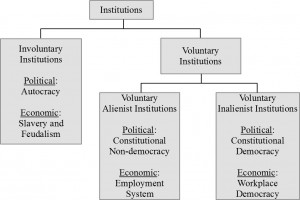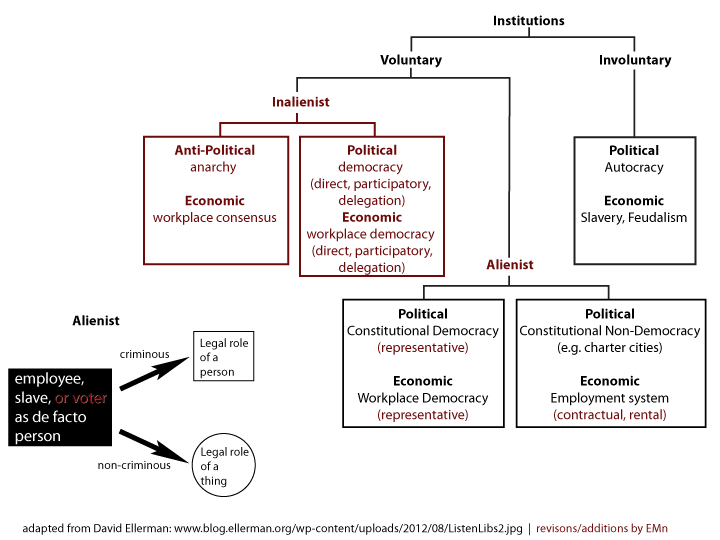What is a human rental?
by David Ellerman and Mike Leung
Human rentals describes how most people earn a living, they rent themselves in exchange for a salary or wage. The self rental typically describes the state of being employed by a firm. Human rentals involves two key features.
The first aspect is the agreement to follow orders within terms of the rental. For example some standard orders would be: produce this, provide this service, design this, or manage these people. The employee generally concedes authority over how the work is performed and under what conditions. The main issue is the delegation of positive governing control. The employer has the ability to command the worker to perform certain actions: work faster, work harder, produce higher quality parts, etc. Or more commonly today, dump these toxins, deny these medical claims, issues these predatory loans, or manage public relations so we can continue doing these things. The rented person must obey, or risk being fired.
The second aspect of a human rental is the transfer of responsibility for the actions of the person while at work. The most obvious is the transfer of responsibility for any profit or loss that results from the worker’s actions. That responsibility is shifted to the owners of the business.
It is important to note that both the alienation of governing control at work and the transfer of responsibility cannot in fact take place. A person can not alienate their authority to a state or firm without a say in the governance, at least if one believes in inalienable rights and democratic theory. At best a person can choose to cooperate, which the legal system then pretends is an actual alienation of authority and fulfillment of the rental contract. This is precisely what our judicial system does with regard to human rentals today.
The transfer of responsibility for personal actions is clearly inalienable as illustrated by the commission of a crime. The judicial system correctly traces criminal responsibility back to all persons involved. It matters little if a person is “hired” to commit a crime. Being contracted to provide services in a crime does not shift responsibility and get a hired criminal off the hook. However, responsibility cannot be transferred in the positive case either, that of productive labor. In this case the legal system closes its eyes and pretends that the employment contract actually transfers responsibility between parties. It thus allows the transfer of profit resulting from labor to be appropriated by another party not responsible for its creation.
The key points:
- Personal responsibility is inalienable. For example, being hired to commit a crime cannot absolve a person of guilt, because responsibility for a person’s actions are intrinsically non-transferable. The inalienability of responsibility is also true in the positive case of productive labor.
- The standard employment contract seeks to transfer responsibility for profits and losses from the employees to the owners of the business, pretending that the workers are not responsible for their actions.
- Since workers are actually responsible for appropriating any profit or loss, they should have governing control of their business. This leads to democratic management by the members of a business.
- In order to bring employment into alignment with peoples inalienable rights, worker owned democratically managed business or worker cooperatives are needed.
Property and Contract in Economics: The Case for Economic Democracy



Pingback: Self-Ownership is Bad Logic, Not Just Bad Grammar | Real Libertarian
Pingback: Minimum Wage, Minimum Cage | Real Libertarian
Pingback: Comment on “A Critique of Kirzner’s Finders-Keepers Defense of Profit” | Real Libertarian
Pingback: The Paradise Papers, A Culture and Tradition of Pilfering Continues – RE:ⒶL LIBERTARIAN
Pingback: 6 Things to Know About Worker Coops – RE:ⒶL LIBERTARIAN
Pingback: Comment on “A Critique of Kirzner’s Finders-Keepers Defense of Profit” – RE:ⒶL LIBERTARIAN
Pingback: I, Pencil – RE:ⒶL LIBERTARIAN
Pingback: I, Pencil – LibertⒶrianous
Pingback: Marginal Costs and Jeremy Rifkin – Libertarianous
Pingback: Can We Do It Ourselves? – Libertarianous
Pingback: Mapping Institutional Privilege, Capitalism and Racism (Inalienist Versus Alienist Institutions) – Libertarianous